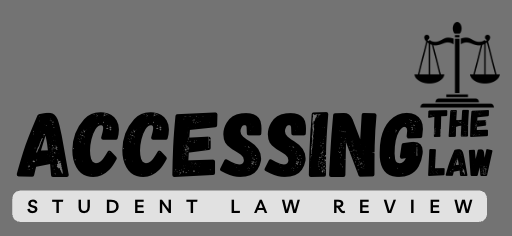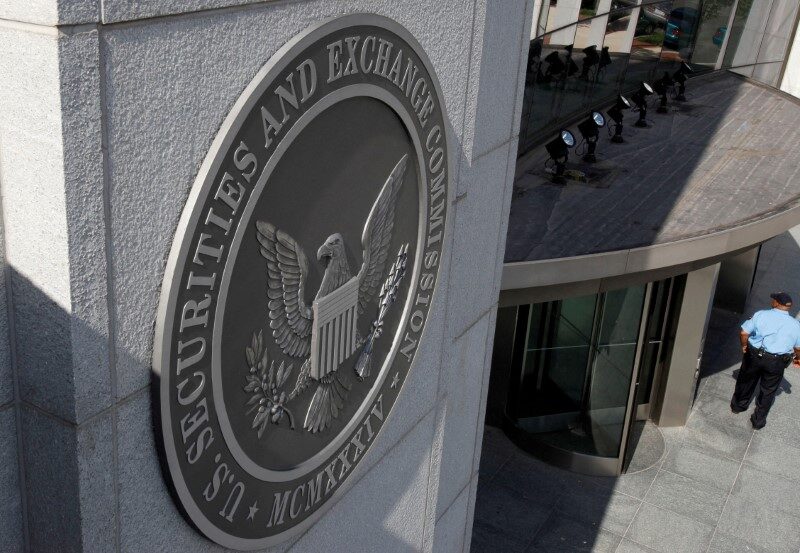Constitutional Law: SEC, Yeah You Know Me: A Legal Analysis of a Supreme Court Decision on Prosecuting Fraud - Securities and Exchange Commission v. Jarkesy (2024)
Written by Sofia Fennell, Rowen Hamilton, Munpreet Kaur, Preet Patel, Kevin Merino
Edited by Rowen Hamilton and Anna Ramesh
Background and Overview
In SEC v. Jarkesy, the discussion revolves around the Seventh Amendment. The defendant is George Jarkesy Jr. and his investment firm, Patriot28. They were charged for committing securities fraud. The plaintiff, the SEC, internally adjudicated Jarkesy without providing an opportunity for a jury trial—a right outlined in the 7th Amendment's promise for a "right of trial by jury." The Dodd-Frank Wall Street Reform and Consumer Protection Act (usually called Dodd-Frank) was established so that the SEC can adjudicate certain civil penalties in-house. This legislation was designed to restrict financial institutions from engaging in certain risky investment strategies, and it granted authority to the SEC in order to levy civil penalties—a power that levied a fine of $300,000 against Jarkesy.
Jarkesy appealed his ruling to the Fifth Circuit Court of Appeals, and they found that the SEC violated the defendant's right to a jury trial. Since the SEC is a civil regulatory agency, it is still subject to respect the Constitution's delegation of 7th Amendment jury assurances when Jarkesy's suspected violation resembles other cases in US common law. The Supreme Court agreed with the Fifth Circuit court and declared that the SEC cannot impose civil penalties without a trial.
Precedent
Richardson v. Perales (1971) - upheld that factual findings made by residing commission members or in-house administrative law judges should be treated as a conclusive and factual basis for court proceedings even if there are occasional oversights or mistakes.
Granfinanciera, S. A. v. Nordberg (1989) and Tull v. United States (1987) - established a test that determines whether a jury trial is permitted by asking if (1) the charges brought are consistent with those that have received jury trials in the past, and (2) if there were any 'public rights' exemptions that could be applied.
Declaration of Independence, Federalist No. 83, Erlinger v. United States (2024), Reid v. Covert (1957), and Parsons v. Bedford (1830) - argued that the English Crown's unwillingness to allow trial by jury for colonists was an instigating reason for revolution and the implementation of the 7th Amendment.
Curtis v. Loether (1974) - clarified that trial-by-jury rights are not only limited to the activities outlined in the common law practice during the time of the 7th Amendment's ratification.
Mertens v. Hewitt Associates (1993) - noted that monetary damages tend to be the initial instinct and first step of legal dispute resolution.
Austin v. United States (1993) - observed that monetary damages—although sometimes compensatory remedial in purpose—are also capable of enforcing retributive justice or fostering deterrence by claiming penalties that exceed the cost of the crime.
United States v. Hansen (2023), Dura Pharmaceuticals, Inc. v. Broudo (2005), Schreiber v. Burlington Northern, Inc. (1985), Chiarella v. United States (1980), Basic Inc. v. Levinson (1988), Northern Pipeline Constr. Co. v. Marathon Pipe Line Co. (1982), and Pernell v. Southall Realty (1974) - noted that the US Congress's use of common law language harkens back to its original meanings and connotations, so the Judiciary should presumptively consider these meanings in connection to the 7th Amendment, the law's application, and the venue of adjudication.
SEC v. Zandford (2002) - clarified that not all examples of common law fraud are subject to the jurisdiction of the SEC.
Herman & MacLean v. Huddleston (1983) - distinguished evidential standards in federal securities fraud—similar to civil offenses—compared to its common law counterparts—similar to more stringent criminal standards of evidence.
Murray's Lessee v. Hoboken Land & Improvement Co. (1856), Stern v. Marshall (2011), Oceanic Steam Navigation Co. v. Stranahan (1909), and Buttfield v. Stranahan (1904) - ruled that courts cannot arbitrate their judicial responsibility in certain matters related to common law precedent because the court is required to refer these cases to a court suited to hear the case. However, cases outside of this category of common law precedent can be adjudicated in Congressionally-designated executive venues.
United States v. Nixon (1974) and The Federalist No. 78 (referencing Montesquieu's The Spirit of Laws) - recognized that the separation of judicial and executive powers is built into the structure of the US.
Northern Pipeline Constr. Co. v. Marathon Pipe Line Co. (1982) - defined whether cases were addressing public or private rights by determining if the actions in question were substantially similar to those addressed in American common law.
United States v. Jicarilla Apache Nation (2011), Crowell v. Benson (1932), and United States v. Duell (1899) - named some exceptions that qualified as public rights exemptions to Article III consideration in this respective order: Indigenous tribes, public lands administration, public benefits.
Thomas v. Union Carbide Agricultural Products Co. (1985) and Oil States Energy Services, LLC v. Greene's Energy Group, LLC (2018) - recognized that the distinction between public rights and private rights is often vague, confusing, and undefined in light of a vast history of precedents.
Atlas Roofing Co. v. Occupational Safety and Health Review Commission (1977) - found that there were public rights exemptions in certain adjudications of financial crimes—later cited by the defendants in SEC v. Jarkesy. However, this precedent is challenged by the SCOTUS in SEC v. Jarkesy because the present instance of civil fraud—adjudicated without a jury trial—is more similar in substance to common law proceedings than the issue at question in Atlas.
INS v. Chadha (1983) - affirmed that efficiency and cost are not sufficient reasons to warrant a public rights exemption.
Effects of Securities and Exchange Commission v. Jarkesy
The finding in SEC v. Jarkesy has limited the power of the SEC and granted more authority to private entities like investment firms. Prior to this ruling, the Dodd-Frank Act allowed the SEC to conduct in-house proceedings for civil penalties. After the decision, the SEC can no longer use its internal judges when charging someone with securities fraud, undermining a key part of the Dodd-Frank Act.
The Court's decision also reinforces the Seventh Amendment by guaranteeing the right to a jury trial in cases where the government seeks financial penalties. Because of this, the SEC must now take these cases to federal court, which can slow down and increase the monetary cost of enforcement. The decision could also impact other federal agencies that use similar in-house systems—like the FTC and EPA—leading to the resolution of future constitutional challenges. Much like Loper Bright Enterprises, this ruling represents a significant change in administrative law by diminishing agency power and enhancing the role of the federal judiciary and private sector.
Terms and Definitions
7th Amendment. In this case, this amendment ensures that "In suits at common law […] the right of trial by jury shall be preserved."
Common law. A legal system based on judicial decisions and custom, forming the basis of law in England since the Middle Ages and influencing legal systems in the United States and other Commonwealth countries.
Environmental Protection Agency (EPA). A federal agency that monitors the environment by developing/maintaining regulations, evaluating health risks, and conducting research.
Federal Trade Commission (FTC). A federal agency enforcing Section 5(a) of the Federal Trade Commission Act, which monitors the fairness and legality of US trade and commerce.
Fraud. The misrepresentation or omission of information to induce investors into trading securities.
In-house (Proceeding). A type of enforcement action initiated by the Securities and Exchange Commission (or another agency) to address securities law violations. These proceedings differ from traditional court litigation as they are conducted with an SEC administrative law judge rather than a federal judge.
Loper Bright Enterprises. A previous, recent case from the Supreme Court that also reduced the power of Executive agencies by overturning Chevron Doctrine.
Private Rights. Private rights that involve individuals, such as the right to stay out of prison, keep property, or protect one's life typically had to be decided by regular courts under Article III. If someone was being convicted of a crime or losing ownership of land, it usually required a traditional court's involvement.
Public Rights (Exemptions). Public rights were those held by everyone in society, not by individuals. They included things the government owned for the people, like public lands or money in the treasury, as well as shared rights that all citizens could enjoy, like traveling on public roads.
Works Cited
Council on Foreign Relations. "What Is the Dodd-Frank Act?" Accessed June 30, 2025.
https://www.cfr.org/backgrounder/what-dodd-frank-act.
Encyclopaedia Britannica. n.d. "Common Law: The Feudal Land Law." Accessed July 6, 2025.
https://www.britannica.com/topic/common-law/The-feudal-land-law.
Environmental Protection Agency. "Environmental Protection Agency." USA.gov. Accessed June 30, 2025.
https://www.usa.gov/agencies/environmental-protection-agency.
Federal Trade Commission. "What the FTC Does." News & Events, Media Resources.
Accessed June 30, 2025. https://www.ftc.gov/news-events/media-resources/what-ftc-does.
Morgan Lewis. 2024. "US Supreme Court Curtails Availability of SEC In‑House Proceedings." Morgan Lewis
LawFlash, June 28, 2024. Accessed July 6, 2025. https://www.morganlewis.com/pubs/2024/06/us‑supreme‑court‑curtails‑availability‑of‑sec‑in‑house‑proceedings morganlewis.com+4morganlewis.com+4morganlewis.com+4
Nelson, Caleb. 2024. "Adjudication in the Political Branches." Notre Dame Law Review 99 (5): 1801–63.
Accessed July 6, 2025. https://scholarship.law.nd.edu/ndlr/vol99/iss5/3/.
Legal Information Institute. n.d. "Securities Fraud." Wex. Accessed July 6, 2025.
https://www.law.cornell.edu/wex/securities_fraud.
"SEC v. Jarkesy, 603 U.S. ___ (2024)." Justia Law, Accessed 25 June 2025.
supreme.justia.com/cases/federal/us/603/22-859/#annotation.
White & Case LLP. "Supreme Court Rules SEC Use of In-House Tribunals Is Unconstitutional in Potentially
Far-Reaching Decision." Tax News, Tax Articles and Information. Accessed June 30, 2025. https://www.whitecase.com/insight-alert/supreme-court-rules-sec-use-house-tribunals-unconstitutional-potentially-far-reaching.

